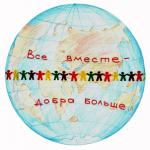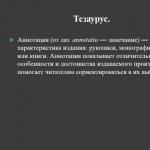HR manager - duties, requirements and competencies. The main professional qualities of an HR manager What an ordinary employee should know about hr
One of the interpretations of the term “competencies” is the area of activity that a person is engaged in in a particular position. For example, the search and selection of personnel is one of the business processes in HR. Another interpretation is a combination of the ability and desire for a certain behavior, for example, the ability to communicate productively and the desire to communicate. The third interpretation of the term is a symbiosis of ZUNs and PVK inherent in a person or important for a position held, for example, knowledge of the Labor Code of the Russian Federation and organization.
Ambiguity and free application term is inconvenient for constructing a scientific text, or for precise research, but in practice (research conducted for a specific organization), this approach seems to work.
The use of the term to describe a position and to characterize a person differs in that a particular employee can evaluate the desire, interest to behave this way and not otherwise. For example, the ability and ability to play the currency exchange can be supported by interest, and even healthy excitement, while a complete lack of interest will mean the absence of this competence.
To evaluate a person in a position, they usually choose key competencies(such as “search and selection of personnel”, for example), and then break them down into those psychological, professionally important components, as well as skills. The ability to search and select personnel, as well as the desire of a particular person to engage in this particular work, is difficult to assess. While communication skills and stress tolerance are more likely to measure.
In a magazine article HR management, dated 2003, Olga Baturina lists . Historically, the first thing is knowledge of personnel records management and legal training. - A very important competency for an HR specialist is orientation towards an internal client (head, line manager), "performance management", in which organizational skills are manifested: planning, delegation, and the like. The work of an HR manager today is closely related to projects, so the competence of “working on projects” is becoming increasingly important.
However, like “the ability to install and manage business relations with partners” – recruiters, training companies, organizers corporate events etc.
An HR manager performs the role of an internal consultant in his company. This concerns the resolution of internal conflicts, for which the HR manager needs the desire and ability, together with the heads of departments, to find ways out of unusual situations. At the same time, an HR manager cannot do without excellent communication skills, the ability to express one's thoughts in writing and orally, and the ability to conduct group discussions.
Consulting competencies are also needed: for example, identifying the needs of internal customers or the ability to ask the “right” questions.
So, the position corresponds to the behavior that is productive. Behavior becomes possible in the presence of certain knowledge, skills and qualities of a person's personality. The key remains - motivation, inner motivation for action, desire.
Portal HT.ru , the Humanitarian Technologies Lab took the right path to find out the key competencies of HR and asked about them from specialists - HR managers and directors.
Readers can get acquainted with the results of the second survey conducted on April 16-17at the exhibition "Personnel-Moscow - 2008" and the first round, held on April 10 at the conferenceHR Networking
internet stage continues to this day and you can take part in it.
The competencies are ranked in descending order of importance. (the higher the number, the less important competence is, according to the respondents)
1. Conducting interviews with applicants
2. Sociability and understanding of people (the ability to establish contact, listen)
3. Stress resistance (in emergency situations)
4. Teamwork (workability)
5. Development of incentive systems (motivation)
6. Emotional self-regulation (control)
7. Corporate loyalty (loyalty)
8. Comprehensive certification of employees
9. Personal organization and discipline
10. Persuasion (impact on people)
11. Decision making under uncertainty
12. Initiative (proposes and solves problems)
13. Discipline (accuracy in performing tasks)
14. HR record keeping
15. Staff Satisfaction Surveys
16. Learning new information technologies
17. Delegation (distribution of tasks)
18. Career counseling for employees
19. Personal high career ambitions
20. Organization of corporate events
21. Application of test technologies
The survey is also interesting.
laboratory "Humanitarian technologies" on the topic
“What a Competent HR Specialist Never Does
H does not forget to inform the applicant about the decision made by the company, even if it is negative - 31.6%
H does not ask under what sign of the Zodiac the applicant was born and what is his favorite number - 26.4%
H Is not late for meetings with applicants - 11.6%
H does not give unambiguous answers, but only forecasts (“this applicant may be good, or maybe bad”) - 8.8%
H does not conduct stress interviews - 8.8%
H does not call people human resources - 8%
D other answer - 4.8%
Other answers were as follows:
Does not divide people into superfluous and not superfluous. I just witnessed when the hr-schik carried out such a division in the open
Doesn't sleep with applicants
Does not forget to inform the applicant about the decision made by the company, even if it is negative
Not lying
Works in the interests of the company, not by itself, but adhering to the overall development strategy. actively involved in the development
Does not create an environment in which the applicant feels uncomfortable, disgusting and humiliated
Does not allow the candidate to mislead, piss off, etc.
Does not use the interview as a way of self-affirmation
An HR manager (often referred to and written as an HR manager) is the modern name for an employee of the HR department who is engaged in the selection and development of employees. HR translates as: "human recourses" human resources. That is, we can say that the job of an HR manager is to manage human resources.
AT Russian companies love to adopt Western experience. This is probably why more and more familiar positions are acquiring the prefix HR. HR directors are called HR director. The head of the HR department can be called the head of HR projects.
The role of an HR manager in business
Cadres decide everything - this saying, perhaps, will be relevant always and everywhere. And people who can effectively search for and retain personnel will be even more in demand. The main task of HR managers is the search and retention of personnel.
Recruitment
The fact is that it is not difficult to find an employee, it is difficult to find the right person for this particular position in a timely manner. When I say "suitable person" I mean the following criteria:
- The candidate must have the necessary (usually large companies created, for all positions);
- The candidate must meet the requirements set by the immediate supervisor. Sometimes management sets very strict criteria that significantly limit the choice;
- The willingness of a person to work for you. There's a lot good specialists, but in order for them to go to work for you, you need to stand out among competitors and the HR manager plays an important role in this process;
- For vacancies where mass hiring of employees is necessary, you need to be able to create the necessary flow and maintain the hiring funnel;
- Suit the specifics of the company. Many companies have their own corporate culture, and many employees will not be able to get along with it, this is also an important criterion for finding staff;
As we see in the HR manager, there are quite a few parameters by which you need to search for personnel. It is worth saying once that only the main search parameters are listed, in fact there are many more.
Staff retention
However, if you find earlier new job it was hard enough. Now, in a large city, a queue of companies ready to offer good working conditions line up for employees. To search for a job, it is enough to post a resume on a special site and go for an interview. In such harsh conditions, HRs are tasked with helping to retain staff.
HR employs a number of best practices to retain staff. Most of the employee retention tools came from the West and began to be introduced in Russia in the last decade. But the most important thing is that the task of the HR service is to use these tools as a system.
Analysis tools
To identify and identify problems with personnel, HR uses the following analysis tools.
- Termination surveys, both written and oral interviews;
- Compilation of loyalty indices, for example;
- Grade managerial competencies senior management (as you know, people come to the company, but leave the leaders);
- Various employee surveys. As a rule, on the subject that you are missing;
- Comparison of the company with competitors in terms of basic working conditions
Retention tools
To retain staff, HRs work in several directions:
- Creation of hygiene factors - stable salary, social package, good workplace etc. You can read more in the article about;
- Development of managerial competencies . The more competent the managers are, the less the outflow of personnel will be;
- Creation corporate culture and company identification in the market. It is important to distinguish the company from competitors, to make the staff love the company;
- Drawing up programs for the development of personnel. Each employee should feel that the company is developing him and moving him forward;
- . There are a lot of options from corporate events to or various trainings. For example - .
HR manager in Russia
It should be noted that the tasks of an HR manager in Russia and in the West are quite different. In the West, the HR department is a link aimed at finding and developing personnel. A lot of attention is paid to working with employees who are already working. In Russia, the situation is very different, basically an HR manager is a personnel officer and a recruiter in one bottle, and in small companies this employee can perform the functions of a secretary, to a business coach or coach.
Life goes on, times change, and with them people and their professions. Over time, society has new requirements and this, of course, entails certain changes. More recently, personnel department employees (HR specialist, personnel department inspector, etc.) were engaged only in personnel records management. But in modern economic conditions, work with personnel has changed somewhat, and began to include not only personnel records management, but also training, assessment, certification, staff motivation, the creation of a corporate culture and an employer brand.
Meet HR Manager (HR Manager) - "human research manager".
HR-manager is a profession of the new millennium. However, this is not to say that this profession is completely new, there are HR specialists in every HR department, but the new name has added a number of new knowledge, requirements and responsibilities.
The differences between a HR manager and an HR manager are quite significant. The specialists of the personnel department carry out "coordination of the human resources of the enterprise", while the personnel manager solves the problems of building an integrated personnel management system.
 The main task of an HR manager is to develop a specific personnel program with a detailed description of the action plan for the search, training and organization of personnel activities, and the creation of a corporate culture. Among the tasks facing this specialist, one can also include the following: organization of a clear and well-coordinated work of the workforce of the enterprise; education and training of company personnel; identifying the motivation of employees of the enterprise with an individual approach to each employee; protection labor resources enterprises from staff turnover.
The main task of an HR manager is to develop a specific personnel program with a detailed description of the action plan for the search, training and organization of personnel activities, and the creation of a corporate culture. Among the tasks facing this specialist, one can also include the following: organization of a clear and well-coordinated work of the workforce of the enterprise; education and training of company personnel; identifying the motivation of employees of the enterprise with an individual approach to each employee; protection labor resources enterprises from staff turnover.
What are the responsibilities of a modern HR manager (HR manager)?
Let's try to understand the essence of this profession today. Its functions primarily include communication with people, that is, the selection of candidates for a vacant position, the creation of a system of rewards and punishments for employees, as well as the maintenance and even development of the corporate style of the company. It is from these people that the atmosphere in the team mainly depends. Therefore, the competence of the personnel manager also includes the duty to formulate and convey to the employees the goals and mission of the enterprise, to carry out activities that would help strengthen the internal spirit of the organization, and also to open up to each employee his prospects for the position he occupies.
Requirements for an HR manager.
The main requirements for a HR manager include higher education, it can be legal, economic, psychological, pedagogical, commercial - by and large, any, but always deep and systemic.
Particular attention is paid to moral qualities. A professional in the industry must be organized, insightful, communicative and practical.
A recruiting manager should be good at communicating with people, and people with him. It is important that there is no burden in communication, because you will have to talk a lot by occupation.
You need to be able to listen to employees, evaluate the characteristics of their behavior, be able to predict professional success, and sometimes even help with practical advice. But at the same time, such a specialist should be a good manager.
The HR manager also requires authority and rigidity in order to be able to cope with the tasks.
Responsibilities of the Human Resources Manager.
Today, the following requirements and responsibilities are put forward for everyone who in one way or another by their position is connected with the profession of a personnel manager:
Observation of the labor market, possession of information about the current situation with personnel, average wages in the market and informing management about this.
Recruit, select and evaluate applicants. Conducting interviews with candidates.
Look for new sources and methods to find professional personnel.
Ability to draw up a professiogram for each individual vacancy, that is, it is good to know what personal and professional qualities an applicant for a particular position should have.
Planning staffing needs for the near future and in the future, creating a reserve of employees, as well as prompt search for the right specialists.
Knowledge of labor laws business communication, work with documents and competent both oral and written speech.
Compilation and design employment contracts, contracts and agreements, the formation and accounting of personal files of employees.
Develops programs for personnel development, business career planning, training and professional development of personnel, as well as in evaluating the effectiveness of training.
Organization of internship programs, training, advanced training, certification of employees, development, organization and implementation of training, social programs.
Takes part in the adaptation of newly hired employees to production activities.
Motivation of company employees, finding an individual approach to them.
Monitoring compliance with the internal regulations of the enterprise, taking part in resolving labor conflicts and disputes.
In addition, possession of creative thinking, analytical mind, long-term and operative memory, as well as sustained attention and observation.
In general, we can say that the work of a recruitment manager is a cunning combination of routine and creative tasks, not everyone can handle them.
To date, there are few highly qualified personnel managers, since the constant provision of the market with ready-made specialists in this field is not done properly. Since 2000, the Ministry of Education of the Russian Federation has approved the specialty "Personnel Management", but the quality of managers with a special university education in this direction leaves much to be desired.
Currently, the demand is met mainly through the retraining of other specialists within the company itself, most often personnel officers. The main way to gain knowledge and professional skills in such a situation becomes self-education, trial and error. However, if you feel strong in yourself, feel free to go to the personnel managers.
NEW APPROACH IN HR WORK: INTRODUCTION OF PROF STANDARDS.
From July 1, 2016, employers are required to apply professional standards if the requirements for the qualifications that an employee needs to perform a certain job function are established Labor Code, federal laws or other regulatory legal acts (Federal Law of May 2, 2015 No. 122-FZ). For other employees, professional standards are advisory in nature.
professional standard- a description of the qualifications necessary for an employee to carry out a certain type of professional activity. The indication of necessity implies the obligation of professional standards without any restrictions.
Article 57 of the Labor Code of the Russian Federation establishes that if, in accordance with the Labor Code, other federal laws, the provision of compensations and benefits or the presence of restrictions is associated with the performance of work in certain positions, professions, specialties, then the name of these positions, professions or specialties and qualification requirements to them must comply with the names and requirements specified in qualification guides approved in the manner prescribed by the Government Russian Federation, or the relevant provisions of professional standards.
The Labor Code defines the qualifications of an employee, which is understood as the level of knowledge, skills, professional skills and work experience of an employee. That is, if the position provides for the presence of qualification restrictions, then the application of professional standards is mandatory for all employers, regardless of organizational legal form organizations.
Why are professional standards needed?
professional standard is the name of an important foundational document containing a description of the following norms:
Labor functions of the employee in accordance with his qualifications and position;
requirements for his experience and knowledge.
Thus, we can say that professional standards include a description of the qualitative level of qualification of an employee, which he must comply with in order to rightfully take his place in the staff of any company, regardless of its type of activity (Article 195.1 of the Labor Code of the Russian Federation).
Why professional standards are needed: distribution of responsibilities
First of all, the professional standard for personnel officers of 2016 delimits the areas of activity of employees of HR services. Now the scope of duties of each specialist is clearly regulated. Based on the content of the new documents:
Record keeping specialists are engaged in the preparation of primary, accounting, planning and organizational and personnel documents (orders, instructions), as well as their registration and archival storage;
Employees involved in the selection of personnel collect and systematize information about the company's current need for personnel, select new employees, interact with government agencies and private individuals in charge of employment issues;
HR managers assess the qualifications of employees, organize and conduct their certification;
Development specialists select advanced training courses, other activities that contribute to career growth workers;
Managers for rationing and remuneration oversee the issues of adjusting the system wages and incentives, development of principles of non-material motivation;
Social policy managers are involved in the development and implementation of relevant social programs, monitor the correctness of their implementation;
Employees whose competence includes resolving issues of personnel migration are engaged in the transfer of employees from one structural unit of the company to another, as well as employment of persons who do not have Russian citizenship;
Managers organize the uninterrupted activity of the department entrusted to them, control the correctness of paperwork and their compliance with the norms of the current legislation, and also prepare internal management reporting.
On the approval of professional standards for personnel officers for 2017.
In the field personnel work The following professional standards currently apply:
1. "Specialist in personnel management" (approved by order of the Ministry of Labor of the Russian Federation dated 06.10.2015 No. 691n). This document contains qualification requirements for heads of HR departments, HR officers, and HR and career guidance specialists.
2. "Recruitment specialist (recruiter)" (approved by order of the Ministry of Labor of the Russian Federation dated 09.10.2015 No. 717n). This standard contains requirements for recruiters, HR managers, whose duties include only the search for employees and their initial adaptation in the workplace.
Download professional standard Recruitment specialist (recruiter).
The professional standard consists of 4 sections:
1. General Provisions.
2. Description of labor functions included in the professional standard.
3. Characteristics of general labor functions (contains a list: labor actions, necessary skills, necessary knowledge).
4. Information about the organizations that developed the professional standard.
Required knowledge and skills
These are the knowledge and skills that a HR manager needs to know and be able to do in order to fulfill his official duties.
In the professional standard of a specialist in personnel management knowledge and skills are given for each labor function within the framework of the generalized one.
So, to perform the first generalized labor function: documentation support for work with personnel (for all three labor functions), knowledge is required:
– labor legislation and other acts containing norms labor law;
— legislation of the Russian Federation on personal data;
— the fundamentals of archival legislation and regulatory legal acts of the Russian Federation, in terms of maintaining documentation on personnel;
– basics of document circulation and documentation support;
— the structure of the organization;
— local regulations of the organization;
— technologies, methods and techniques for analyzing and systematizing documents and information;
— norms of ethics and business communication.
— basic foundations of informatics, structural construction information systems and features of working with them.
You can find a list of all labor functions, knowledge and skills for their implementation in professional standards by downloading them above.
In the light of recent economic transformations modern market work has changed markedly. Therefore, there is a need for specialists who not only register people for work, but also select the most suitable employees, and also contribute to their effective work. It was then that HR-specialists ("eychers") appeared, who, unlike ordinary "personnel officers", have a wider range of responsibilities, which we will talk about today.
Each person, when applying for a job, goes through such an instance as the personnel department. From the Soviet times personnel officers"were filling work books, personal affairs, writing job descriptions, issuing passes, etc. It was enough for such a specialist to understand labor legislation and office work, while there was no question of finding and attracting personnel.
However, in the light of recent economic transformations, the modern labor market has changed markedly, which is why many organizations have changed the personnel management system. Therefore, there is a need for specialists who not only register people for work, but also select the most suitable employees, and also contribute to their effective work.
It was then that HR-specialists ("eychers") appeared, who, unlike ordinary "personnel officers", have a wider range of responsibilities, which we will talk about today.
Who is an HR Specialist?

The abbreviation "HR" stands for "human resources". Thus, it can be understood that - this is an employee of the company, in general, responsible for the human resources of the enterprise: the formation of personnel, its development and motivation.
The formation of this profession began in the first decades of the 20th century, when American specialists drew attention to the importance of the human factor in business development. Over time, a separate direction appeared, considering the methods of effective organization of work and motivation of employees. Gradually, this approach developed and had a significant impact on the views regarding the management of the company. By the 1970s, there was general concept personnel management, and full-fledged HR specialists began to appear.
Foreign trends in personnel management came to us after perestroika, when foreign companies began to work in Russia.
A modern HR specialist can perform a wide range of duties:
- search, selection and evaluation of personnel;
- choice personnel policy for efficient use of personnel;
- Ensuring the staffing of the organization with employees of the necessary professions;
- organization of adaptation of new employees;
- organization of training and advanced training of personnel;
- tracking the socio-psychological microclimate in the team;
- organization personnel records and maintaining/supervising personnel records management;
- performance appraisal of employees;
- staff development and training;
- development of a system of incentives and penalties for employees.
Positive result of activity " eychera"is expressed in the sufficient provision of the organization with qualified and responsible specialists who are highly motivated to work. In addition, the efforts of this specialist help to minimize staff turnover by creating a favorable climate and providing employees with comfortable working conditions, which is a difficult task nowadays.
Today, specialists of this profile are in demand in training centers, recruitment agencies and organizations of any profile.
What qualities should an HR specialist have?

Modern HR specialist The company must have the following knowledge and skills:
- possession of methods of personnel management;
- possession modern methods staff assessments;
- knowledge of the basics of office work;
- knowledge of business management principles;
- knowledge of labor legislation;
- knowledge of the ethics of business communication;
- basics of labor motivation and personnel assessment system;
- understanding the foundations of sociology and psychology of management;
- Confident PC skills (working with programs for personnel accounting at the enterprise);
- the ability to assess the competence of the candidate;
- the ability to plan your work;
- ability to work with test materials;
- ability to resolve conflict situations.
Perform quality work HR specialist job such personal qualities, as:
- active life position;
- impartiality;
- communication;
- leadership skills;
- personal motivation;
- responsibility;
- stress resistance and the ability to manage their emotions;
- patience;
- Ability to work in a team and manage conflicts.
An HR specialist should not just be someone who needs to be convinced that you are the right candidate for a certain position, but also someone who will be the mainstay of all hired employees.
Benefits of being an HR specialist
Based on the list of professional qualities and job titles duties of an HR specialist, we can conclude that the "eycher" must have both legal, economic, and psychological knowledge. A comprehensive development is always useful, both at work and in personal life.
Every entrepreneur is well aware that "Personnel decides everything!" Therefore, the presence of a specialist who can work effectively with them is very useful today. Therefore, the demand for smart HR specialists is steadily growing every year, and the profession itself belongs to the category professions of the future.
Good HR specialists are not only in demand, but also have good incomes. Depending on the work experience and the number of staff under their care, their salary can vary from 10,000 to 100,000 rubles.
It is impossible not to say that personnel officers are respected among the company's employees. They are also appreciated by the management, of course, provided that the "eycher" brings real benefits, and does not perform the work of an ordinary personnel officer of the Soviet era.
Disadvantages of being an HR professional

Daily interaction with people requires a lot of energy, patience and resistance to stress from the "eycher". Constant stress leads to neurosis and depression, which affects not only the general well-being of the specialist, but also reduces the efficiency of the HR specialist. But often you need to pay attention also to paperwork ...
It is worth remembering that this specialist has a great responsibility for work with human resources. The further success of the company largely depends on how the team is formed, which means that the HR specialist will be responsible for the performance of all employees.
Sometimes you need to be torn between the needs of the staff and the loyalty of the management. A typical example: "Acher" sees the need to stimulate employees, and the boss says that there are no funds for this.
Job seekers often see unfamiliar job titles in ads. And it becomes unclear what needs to be done, what are his duties and whether this option is suitable. Over the past 20 years, many such positions have appeared. One of the newest is the ichar manager. Who it is, what it does and what it is responsible for, we will consider below.
The origin of the profession and basic concepts
In fact, "ichar" ("eychar") came from the English abbreviation HR ( Human Resources - human resources. Accordingly, an HR manager is a person who deals with human resources in an enterprise.
But it is a mistake to compare it with the “personnel officer” familiar to us. HR is the definition of a specialty that combines work in the HR department and HR manager. That is, his duties are much broader than just accepting a new employee and processing the relevant documents.
Experts evaluate this type of activity, as one of the administrative .
HR- assistant to the head of the organization, who equally with the director shares responsibility for the decisions made and develops a strategy for managing the enterprise, based on the available human resources and their capabilities.
Today, more and more companies are replacing the "HR department" with "HR departments", as their capabilities are much wider.

HR manager competencies
To make it clearer, let's put it on the shelves, what qualities and knowledge are needed here in order to solve production problems:
- Knowledge in the following areas: marketing and sales, information Technology, workforce activity;
- Professionalism, one must be able to: develop a wage system, attract suitable employees, write clear messages for employees;
- It is necessary to understand how to manage change: encourage creativity in others, identify problems that impede business development, build trust, play an active role in the process of implementing changes;
- You need to know how to become a leader in a team, inspire personal trust: make fair remarks, offer ideas for solving problems, take risks, get along with stakeholders.
And that's not it. An HR specialist must be able to manage the culture in the enterprise and aim it at customer satisfaction. Thus, it turns out that the modern "personnel officer" should not only lead the staff, but also fully participate in all the affairs of the organization take responsibility for possible risks.

What qualities should a candidate for the position of HR specialist have?
In modern universities, they do not yet teach HR. How then to get a job, what do employers focus on? You must be a person of a certain warehouse, have the necessary data:
- Be able to understand people. You should understand at a glance who came to get a job, whether this candidate is suitable. Or feel what behavioral line to choose when communicating with a particular employee, partner, competitor. You don't have to be a psychologist or get a college degree to do this, some people are naturally perceptive;
- Important communication and flexibility. It is important to understand how to behave in internal and external conflict situations in order to resolve them with minimal damage to everyone;
- benevolence- one of the main features of such a specialist. A competent "personnel officer" should be able to take care of his employees within reason.
And, of course, you just need to be stress-resistant, because you have to constantly "be between two fires."

HR Manager: Responsibilities
To achieve the goals set by the organization, each employee must know their responsibilities. Their implementation helps to move the common cause forward.
The HR manager should also know their responsibilities, although they may differ in different enterprises:
- Personnel search;
- Maintaining relevant documentation: registration of contracts, agreements;
- Evaluation of the work of employees and their certification;
- Development of a payment system;
- Organization of events related to the introduction of new employees to the position;
- Calculation of the need for personnel;
- Study of the labor market;
- Carrying out activities designed to determine the qualifications of an employee, professionalism and psychological qualities;
- Organization of workplaces.
Among other things, specialists who are legally “savvy” and know foreign languages are more valued.

Area of responsibility
There is also HR manager's area of responsibility. The personnel officer must follow:
- Compliance with the rules of the schedule;
- The quality of performance of duties;
- Execution of instructions, orders and assignments;
- Distribution of trade secrets and confidential information of the company.
Ichar (HR manager) is a versatile specialist, he has many responsibilities. But the salary will be corresponding. A person without experience receives a little, on average from 35,000 rubles. However, after gaining experience in this area, you can earn from 50,000 and more. And if you have additional skills and communication skills, the desire to study further, earnings increase significantly.
Today on large enterprises preference is given to HR departments. It is more profitable and efficient. Therefore, the demand for specialists in this field is growing and there are many vacancies where an ichar manager is required. Who it is, what it does, it has now become a little clearer, and you can assess whether such a position suits you.

Video about HR managers
In this video, Elena Vlasova (HR manager) at Sanita will tell you why she chose a profession related to the recruitment and management of personnel, which is part of her duties:





